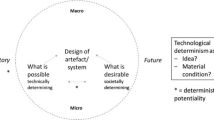Abstract
Although technology education has a long history in practice (i.e. apprenticeship model, guilds), the theorisation of learning technology and design is relatively recent when compared with other disciplines, such as science education. Consequently, this chapter examines how scholars of technology education in contemporary times have theorised their work in their quest for better understanding how teachers teach and young people learn in technology education. To achieve this goal, this chapter conceptualises the outcomes of this focused theoretical review by examining the essence of what constitutes constructivism, social-constructivism, sociocultural theory and cultural-historical theory. In drawing upon primary sources, the questions posed for critique are: How does each inform design and technology education? What is unique to each? What is the same? What might be the gaps? A critique of the grey zone between social constructivism and cultural-historical theory will be made in the context of theories placed on a continuum, which moves from ‘in the head’ and ‘in the hand’, to a dialectical relation between cultural and societal contexts and the cultural development of the person through technology education. It is argued that through examining the alignment, contradictions and movement of thought practice, a theoretically informed discussion of learning the practice and knowledge of technology and design is possible. The chapter concludes by returning to the theoretical review to present a discussion on the place of theory for informing a dialectical understanding of how young people learn and teachers teach in technology and design education.
Access this chapter
Tax calculation will be finalised at checkout
Purchases are for personal use only
Similar content being viewed by others
References
AP images. (2018). http://www.apimages.com/metadata/Index/Self-Driving-Vehicle-Fatality/d7a9837e1275452d84aed6ea70a7f9ec/2/0). Accessed 12th July 2018.
Barlex, D. (2012). Curriculum development. In P. J. Williams (Ed.), Technology education for teachers. International Technology Education Studies. (pp. 196–230). Sense Publishers, Rotterdam.
Barlex, D. (2017). Disruptive technologies. In P. J. Williams & K. Stables (Eds.), Critique in design and technology education. Contemporary issues in technology education. Singapore: Springer.
De Vries, J. R. (2014). Technological knowledge and artifacts: An analytical view, In De Vries, J.R. (eds). Defining technological literacy. Towards an epistemological framework. Palgrave MacMillan, New York, US, (pp. 23–40).
Djordjevic, B., Spirtovic, O., & Acimovic, D. (2016). Social constructivism and technology. International Journal of Business and Social Science, 7(11), 178–189.
Eames, C. (2016). Exploring teacher pedagogical content knowledge (PCK) development using CoRes (content representations). In D. S. P. Gedera & P. J. Williams (Eds.), Activity theory in education. Research and practice (pp. 169–182). Rotterdam, The Netherlands: Sense Publishers.
Education Council. (2018). Optimising STEM industry-school partnerships: Inspiring Australia’s next generation, final report, STEM Partnership Forum, Carlton South, Australia.
Engestrom, Y. (1999). Activity theory and individual and social transformation. In Y. Engestrom, R. Miettinen, & R.-L. Punamaki (Eds.), Perspectives on activity theory (pp. 19–38). Cambridge, UK: University of Cambridge.
Fox-Turnbull, W. H. (2015). Conversations to support learning in technology education. In P. J. Williams, A. Jones, & C. Buntting (Eds.), The future of technology education (pp. 99–120). Singapore: Springer.
Firat, M. (2017). Growing misconception of technology: Investigation of elementary students’ recondition of and reasoning about technological artifacts. International Journal of Technology and Design Education, 27, 183–199. https://doi.org/10.1007/s10798-015-9351-y
Fleury, S., & Garrison, J. (2014). Toward a new philosophical anthropology of education: Fuller considerations of social constructivism. Interchange, 45, 19–41. https://doi.org/10.1007/s10780-014-9216-4
Gonzalez, N., Moll, L. C., & Amanti, C. (2005). Funds of knowledge. In Theorizing practices in households, communities and classrooms. Mahwah, NJ: Lawrence Erlbaum Associates Publishers.
Gumbo, M. T. (2015). Indigenous technology in technology education curricula and teaching. In P. J. Williams, A. Jones, & C. Buntting (Eds.), The future of technology education (pp. 57–76). Singapore: Springer.
Harvey, D. M., & Caro, R. (2017). Building TPACK in preservice teachers through explicit course design. Technology Trends, 61, 106–114. https://doi.org/10.1007/w11528-016-0120-x
Head, G., & Dakers, J. (2005). Verillon’s trio and Wenger’s community: Learning in technology education. International Journal of Technology and Design Education, 14, 33–46.
Hedegaard, M. (2012). Analyzing children’s learning and development in everyday settings from a cultural-historical wholeness approach. Mind Culture and Activity, 19(2), 127–138.
Himmelreich, J. (2018). The everyday ethical challenges of self-driving cars Posted March 27, 2018 9.42pm AEDT, The Conversation, http://theconversation.com/the-everyday-ethical-challenges-of-self-driving-cars-92710. Accessed 12th July 2018.
Jones, A., Buntting, C., & de Vries, M. J. (2013). The developing field of technology education: A review to look forward. International Journal of Technology and Design Education, 23, 191–212. https://doi.org/10.1007/s10798-011-9174-4
Kotezee, B. (2010). Seven posers in the constructivist classroom. London Review of Education, 8(2), 177–187. https://doi.org/10.1080/14748460.2010.487340
Koycu, U., & de Vries, M. J. (2016). What preconceptions and attitudes about engineering are prevalent amongst upper secondary school pupils? An international study. International Journal of Technology and Design Education, 26, 243–258. https://doi.org/10.1007/s10798-015-9306-4
Krahenbuhl, K. S. (2016). Student-centered education and constructivism: Challenges, concerns and clarity for teachers. The Clearing House: A Journal of Educational Strategies, Issues and Ideas, 89(3), 97–105. https://doi.org/10.1080/00098655.2016.1191311
Lave, J. (1988). Cognition in practice. Cambridge, UK: Cambridge University Press.
Leontiev, A. N., & Luria, A. R. (2005). The problem of the development of the intellect and learning in human psychology. Journal of Russian and East European Psychology, 43(4), 34–47.
Liu, C. H., & Matthews, R. (2005). Vygotsky’s philosophy: Constructivism and its criticisms examined. International Education Journal, 6(3), 386–399.
Lockley, J. (2016). Teachers designing classroom cultural through the lens of cultural-historical theory. In D. S. P. Gedera & P. J. Williams (Eds.), Activity theory in education. Research and practice (pp. 183–198). Rotterdam, The Netherlands: Sense Publishers.
Mapotse, T. A. (2017). Development of a technology education cascading theory through community engagement site-based support. International Journal of Technology and Design Education. https://doi.org/10.1007/s10798-017-9411-6
Papert, S., & Harel, I. (1991). Situating constructionism. In S. Papert & I. Harel (Eds.), Constructionism. New York: Ablex Publishing.
Pavlova. (2015). Design and technology education for sustainable futures: In preparation for global citizenship. In K. Stables & S. Keirl (Eds.), Environment, ethics and cultures. Design and technology education’s contribution to sustainable global futures (pp. 87–100). Rotterdam Sense Publishers.
Petrina, S. (2000). The political ecology of design and technology education: An inquiry into methods. International Journal of Technology and Design Education, 10, 207–237. https://doi.org/10.1023/A:1008955016067
Scharff, R. C., & Dusek, V. (Eds.). (2003). Philosophy of technology. The technological condition. An anthology. Malden, MA: Blackwell Publishing.
Seeman, K. (2015). Designing for cultural groups and humanization: Two ideas from design anthropology. In K. Stables & S. Keirl (Eds.), Environment, ethics and cultures. Design and technology education’s contribution to sustainable global futures (pp. 101–118). Rotterdam Sense Publishers.
Slatter, W., & France, B. (2011a). Taking part in the dance: Technology teachers interacting with communities of practice. International Journal of Technology and Design Education, 21, 217–233. https://doi.org/10.1007/s10798-010-9115-7
Slatter, W., & France, B. (2011b). The teacher-community of practice-student interaction in the New Zealand technology classroom. International Journal of Technology and Design Education, 21, 149–160. https://doi.org/10.1007/s10798-000-9111-y
Vygotsky, L. S. (1987). Problems of general psychology. In R. W. Rieber & A. S. Carton (Eds.), Trans by N. Minick. The collected works of L.S. Vygotsky (Vol. 1). New York: Plenum Press.
Vygotsky, L. S. (1994). The problem of the environment. In J. Valsiner & R. vander Veer (Eds.), The Vygotsky reader (pp. 347–348). Oxford: Blackwell.
Vygotsky, L. S. (2004). Imagination and creativity in childhood. Journal of Russian and East European Psychology, 42(1), 7–97.
Wajcman, J. (2004). TechnoFeminism. Cambridge, UK: Polity.
Wajcman, J. (2010). Feminist theories of technology. Cambridge Journal of Economics, 34(1), 143–152. https://doi.org/10.1093/cje/ben057
Williams, J. P. (2016). Research in technology education: Looking back to move forward … again. International Journal Technological and Design Education, 26, 149–157. https://doi.org/10.1007/s10798-015-9316-1
Williams, J., Eames, C., Hume, A., & Lockley, J. (2012). Promoting pedagogical content knowledge development for early career secondary teachers in science and technology using content representations. Research in Science and Technological Education, 30(3), 327–343. https://doi.org/10.1080/-2635143.2012.740005
Author information
Authors and Affiliations
Corresponding author
Editor information
Editors and Affiliations
Rights and permissions
Copyright information
© 2020 Springer Nature Switzerland AG
About this chapter
Cite this chapter
Fleer, M. (2020). Technology Education: The Promise of Cultural-Historical Theory for Advancing the Field. In: Williams, P.J., Barlex, D. (eds) Pedagogy for Technology Education in Secondary Schools. Contemporary Issues in Technology Education. Springer, Cham. https://doi.org/10.1007/978-3-030-41548-8_2
Download citation
DOI: https://doi.org/10.1007/978-3-030-41548-8_2
Published:
Publisher Name: Springer, Cham
Print ISBN: 978-3-030-41547-1
Online ISBN: 978-3-030-41548-8
eBook Packages: EducationEducation (R0)




